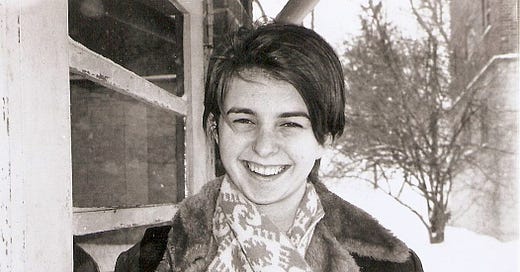I’ve had few requests from readers who have wanted to listen to these posts, so today I’ve included a voiceover where I read the piece. If you like this audio format, please let me know so I can do more of these in the future! -SZB
I’ll begin by saying that I think the worst thing he did was fail to communicate he wasn’t as enamored of me as I was of him after I thought something had started between us.
It was the lack of a phone call, which was more common than texting at the time, that earned him the glare every time I saw him on campus, which was often my last semester of college. I practiced the look in the bathroom mirror, honed it, to make sure every time we crossed paths he would wither under my gaze.
I want to specify that, like me, he was a student at the college. We never dated. In my four years at the small liberal arts school in Ohio, I never went out with anyone on campus.
In retrospect, even though I considered myself desirable, I was offering a pretty complex internal deck at the time: extremely anxious, devoutly religious, and strongly feminist. During my college career, I both led the Women’s House, a progressive co-op residence on campus and participated in a youth ministry program whose purpose was to encourage high schoolers to commit their lives to Christ. I was very serious about molding myself into a person who could use the gifts God had given her to change the world.
Academically, I loved being at a small liberal arts school and thrived in that learning environment. Socially, I often felt disconnected and frustrated with the fishbowl nature of the tiny campus. When things went south between me and my crush, who seemed like my last chance at a college romance, I was hurt. Hence, the glare, which reflected more than just his perceived betrayal. It encompassed all the ways I’d failed to fit in.
A Recent Incident
Close to twenty years later, and I am basically living on a small liberal arts campus again. As discussed in the Department of Hanging Around, I eat at the dining hall every day, attend public lectures regularly, and walk my dog around the school grounds.
I don’t want to detail the specifics, but I recently had a small confrontation with someone on campus. Not too big of a deal, basically one of those situations where a mild annoyance led to a much more heated discussion than necessary because things went unspoken for too long.
This wasn’t a matter of thwarted romance and much more of a logistical issue, but in the aftermath, when I considered what I would do when I saw this person again, memories of the glare resurfaced.
It was tempting to resurrect it, but so far I’ve opted for the averted gaze, which is much easier to get away with in the Northeast than it would be in Ohio where it’s rude to walk by someone without acknowledging them.
A life defined
I’d rather be known for my friends than my enemies.
This sounds like the kind of statement one might find in a coffee table book filled with quotes from famous people. I could swear I’ve heard it before, but searching the phrase didn’t bring up a source. As a woman raised in the Midwest, I consider its sentiment to be almost rhetorical.
I grew up wanting everyone to like me. Anytime I have been faced with serious confrontation, I’ve felt guilty and tried to shift at least part of the blame to myself.
When I think about the relationships that have shaped my life, I think first of the positive ones and try to keep the painful ones buried even though the latter have surely had an effect on who I’ve become.
How about you? Can you engage with the role enemies have played in your life as easily as friends? Do you, like me, want everyone to like you? Why or why not?






I actually really liked listening to this! I usually care about the enemies but lately I have decided I am going to ignore the haters!